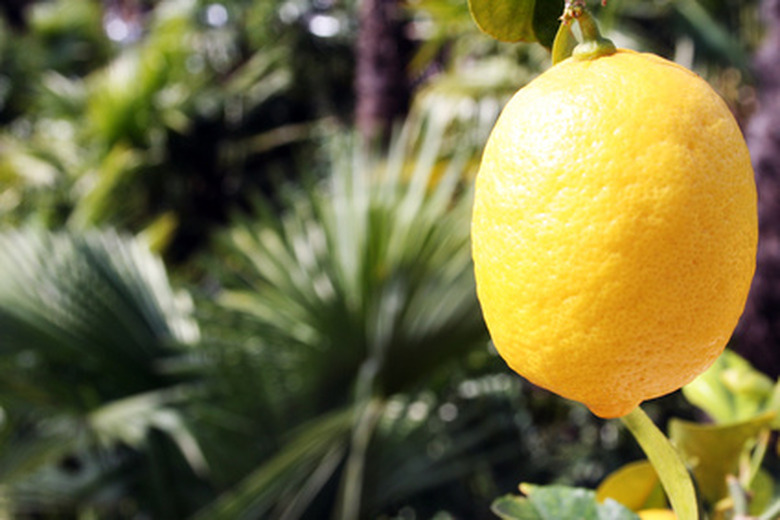Lemon Trees In Greece
Among citrus plants, lemon trees are among the most sensitive to cold weather. Because of this, lemon trees require warm conditions to grow properly. These conditions are commonly found throughout the Mediterranean, including Greece. The country is a major grower and exporter of lemons. One major tourist attraction in Greece is even a large forest of lemon trees located on the island of Poros in the Saronic Gulf.
History
Lemon trees were first grown in Southeast Asia. Although the exact origin of lemons is unknown, according to Purdue University, one possible source is northwest India. Persian traders carried the trees along trade routes known as the Silk Road that ran between Asia and the Mediterranean region. According to the BBC, these early traders carried lemon trees to Greece around 300 B.C. During the middle ages, they were known as "golden apples" and were traded for cloth, artifacts and precious metals. Lemons were also prized for their healing properties.
- Among citrus plants, lemon trees are among the most sensitive to cold weather.
- According to the BBC, these early traders carried lemon trees to Greece around 300 B.C.
- During the middle ages, they were known as "golden apples" and were traded for cloth, artifacts and precious metals.
Function
Greek lemons are exported from the country for a number of different uses. A single lemon has between 40 and 70 percent of a person's recommended daily allowance of vitamin C. The healing properties of a lemon include include antioxidant, antiseptic, anti-spasmodic, diuretic, bactericidal, astringent, antiscorbutic, febrifuge, antifungal, antihypertensive, antiviral, insecticide and immune-stimulant properties. Lemon oil is used in cosmetics and perfumes as well as soaps, lotions, bug sprays and lemon-scented cleaning products. Lemon oil may also be used in machine oil or as a furniture polish. Lemon byproducts such as pulp left over from juicemaking may be used as a livestock feed.
Significance
Twenty-nine of Greece's 54 prefectures grow lemons commercially. Lemon production in Greece is second only to orange production in the number of tons of fruit exported. According to the Agricultural University of Athens, Greece grows between 140,000 and 170,000 tons of lemons yearly and exports between 40,000 and 60,000 tons of the fruit.
- Greek lemons are exported from the country for a number of different uses.
Types
Primary varieties of lemon grown in Greece include Eureka, Adamopoulou, Interdonato, Santa Teresa, Maglini, Zagara Bianca, Lisbon and Vakalou. Additional varieties that are grown commercially include Karystino, Local Polyforo and Common Seeded varieties.
Considerations
As of 1985, the Greek government banned the import of all citrus planting material. This measure was taken to avoid bringing citrus viruses, such as citrus tristeza, into Greece. Healthy citrus propagation material is produced through a small number of citrus production stations throughout Greece. Citrus growers may purchase seedlings, rootstock and budwood at these locations.
References
- "Virus and Virus-like Diseases of Citrus in Greece and Certification;" P.E.Kyriakopoulou; 1995
- Purdue University Extension: Lemon
- Texas A&M University Extension: Home Fruit Production: Lemons
